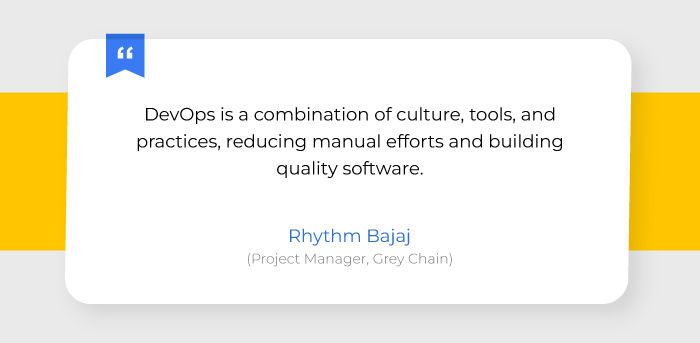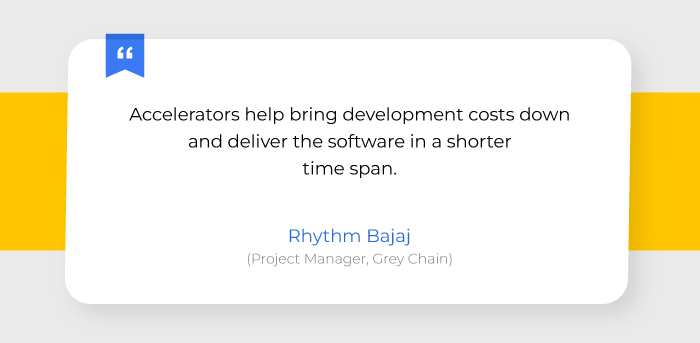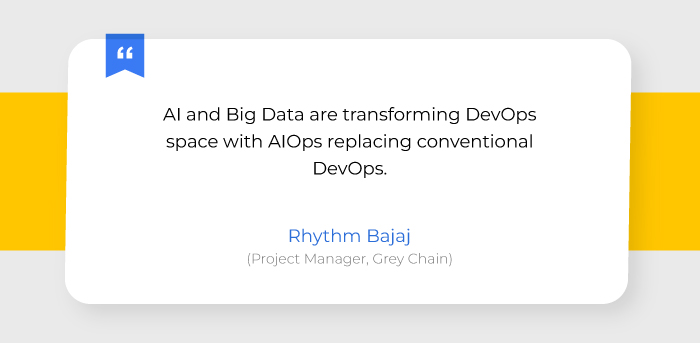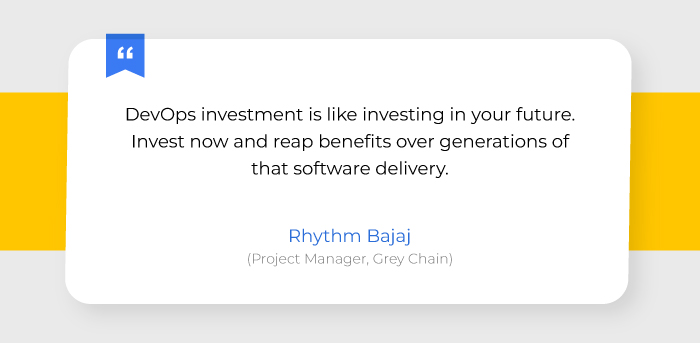The term DevOps is a popular IT work culture practice that combines two separate departments; software development and IT operations. This philosophy allows IT and software development companies to adopt a collaborative approach between the teams, enhance communication and reduce the software development lifecycle through seamless integration and automation of the processes. DevOps pass through various stages, such as planning, coding, building, testing, deploying, and monitoring, all in a loop. It helps companies accelerate the release of applications and products with improved quality, scalability, and stability. DevOps also bolster the security of software applications by implementing agile methodologies and active security audits.
Goodfirms Roundtable is a sequence of podcast discussions with top industry professionals and leaders like CEOs, CTOs, project managers, etc., specifically conducted to gain comprehensive knowledge and meaningful insights on various topics related to IT services. This helps budding entrepreneurs get relevant tips on how to start new ventures and cope with challenges.
In this following podcast discussion, Goodfirms has interacted with Rhythm Bajaj, Project Manager of Grey Chain on various aspects of DevOps practices.
Grey Chain is a top mobile app development company and leading web development agency based in India and the US, offering a wide range of services, such as UI/UX designing, artificial intelligence, and machine learning. The company holds expertise in providing Tech CoE (Center of Excellence) in staff augmentation and building enterprise app development based on specific business requirements. Gey Chain was recently recognized by Goodfirms as the ‘Best Company to Work With’ in 2022.
The podcast discussion highlights the following points
- Definition of DevOps and its role in the project development cycle
- How were projects executed before DevOps implementation?
- What is DevOps Accelerator and what are its benefits?
- Key DevOps tools used for better collaboration and their functions
- What significant changes will AI, ML, and Big Data bring in the future DevOps development?
This podcast discussion also focuses on a few other vital areas
- Vital tips to consider while choosing the right DevOps partner
- Key challenges of successfully implementing a DevOps philosophy
- How Goodfirms has helped Grey Chain stand out as a DevOps expert?
Before we can dive into the topic, our audience would like to know what exactly DevOps is and what role it plays in the development cycle of a project.
Rhythm Bajaj defines DevOps as a combination of culture, tools, and practices that help build, deliver and operate robust and efficient software services. It reduces the manual redundant effort and allows developers to focus on building quality software.

While DevOps has been adopted to combine software development and IT operations, aiming to shorten the development life cycle, how did things work before implementing it?
It becomes important that professionals who build the software take the responsibility of running the same. It helps them understand the operational challenges and allows them to provide better quality services to the end customers. The software has been delivered for decades when the terms DevOps & SRE were not even coined. But with the advent of these philosophies, software deliveries have become faster and at scale.
Now that we are discussing DevOps, a term that is also heard a lot is “DevOps Accelerator”. Can you please explain what is that and why it is needed in the existing DevOps environment?
Accelerators are prebuilt flexible and pluggable components like templated CICD pipelines, application monitoring observability stacks, metrics dashboards, etc. You can reuse this component easily to build the software without having to write boilerplate codes from scratch for every new component or service created. Accelerators help to reduce the cost of software development and relatively deliver it within a shorter time.

While DevOps is a practice or a methodology that brings development and operations teams together, it also requires certain tools that improve collaboration and enhance automation. Can you please mention a few tools that are used and explain each of their functions?
The software development industry is using a wide range of DevOps tools, ranging from
- Source code management tools like Gitlab, GitHub & Bitbucket help with version control of code.
- CICD tools like Jenkins or Gitlab help in the automated building and deployment of code to servers on the cloud or on-premise.
- Also, there are runtime management platforms like Kubernetes & docker which help run auto-recoverable and scalable services.
The categories and list of such tools are too vast to cover here. I would recommend looking at the DevOps Tools Periodic Chart published by XebiaLabs to get a better understanding of these tools and categories.
Emerging technologies like AI/ML, Big Data, etc. are making a significant impact on every other industry and changing its future and we believe the future of DevOps is bound to change as well. So, due to these technologies, what are some changes that entrepreneurs and developers can expect while dealing with DevOps in the future?
I believe that artificial intelligence and Big Data are transforming the DevOps space. Conventional DevOps getting replaced by AIOps. Also, the advanced tools can efficiently monitor your application stack and predict that an issue is about to occur by analyzing current data flows and comparing them with past usages. This will equip the organizations to prevent issues from happening and reduce disruptions.

Creating a DevOps process for your company can be intimidating, not to mention the numerous processes that must be taken into consideration. Thus, it is always best to outsource it to an experienced company. Can you please provide a few checkpoints that a company must consider in choosing the right DevOps service partner?
A company must consider these essential checkpoints or factors to select the right DevOps service partner. These include
- It must look for relevant experience where the partner organization has solved similar use cases.
- It must select the right set of prebuilt accelerators that can help fast-track the transformation journey.
- It must choose a partner who is transparent and ready to transfer knowledge to your internal teams for long-term efficiency.
Can you please shed light on what are the challenges associated with successfully implementing it in an organization of any size?
DevOps is an efficient and effective way of delivering software and often it takes time for business stakeholders to understand its value. The toughest part is to get the initial buy-in and investment. But DevOps investment is like investing in your future, invest now and reap benefits over generations of that software delivery.

Implementing DevOps is a tedious process for any organization, and showcasing yourself as the best is the only way to stay discoverable and bag clients. Can you please mention how Goodfirms has helped GreyChain come off as someone who is an expert in implementing DevOps methodologies for any organization?
Goodfirms' reach has helped us to showcase our expertise in the field of enterprise development and DevOps. Also, this top-rated IT research and review platform helped us connect with the right businesses, looking for DevOps solutions.
You can listen to this podcast discussion here.
What’s Next
DevOps practices eliminate all silos between development and operations teams by strengthening collaboration and merging two teams as one. The development team mainly focuses on writing and updating the application codes, adding new features, fixing bug errors, and ensuring that the product meets business objectives, while the operation team is responsible for infrastructure monitoring, deploying, and managing the software applications.
Also, transformative trends like serverless computing, AIOps, microservice architecture, DevSecOps, etc., fueling DevOps, will change further and become more innovative and streamlined.
If you are interested in enrolling for the next podcast discussion, feel free to send an email to [email protected].








